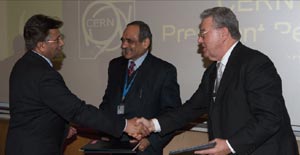On 25 January Pervez Musharraf, president of Pakistan, visited CERN with five government ministers, Parvez Butt, president of Pakistan’s Atomic Energy Commission (PAEC), and an eminent former president of the Commission, Ishfaq Ahmad, who pioneered co-operation with CERN. The visit included a tour of CMS, to which Pakistan is making a substantial contribution, and an opportunity for Musharraf to address CERN’s Pakistani scientists.

During the visit, Butt and CERN’s director-general, Robert Aymar, signed an addendum to the 2003 Protocol Agreement covering the supply of additional equipment for the Large Hadron Collider (LHC). They also signed a letter of intent aimed at strengthening scientific and technical co-operation between CERN and Pakistan. The document envisages an extension of the existing partnership not only in new accelerators, detectors and information technologies, but also in educating and training scientists and technical experts.
In 1994 CERN and Pakistan signed their first formal collaboration agreement, and in 1997 a protocol was signed for the supply of eight huge steel feet for the CMS magnet yoke. This was supplemented in 2000 by a memorandum of understanding for the production of 288 muon chambers and electronic components for the experiment. Three years later, the co-operation gained new impetus with a new protocol of understanding with CERN.
There are currently 75 Pakistani physicists and engineers taking part in three major CERN projects: CMS, ATLAS and the development of the Computing Grid for the LHC (LCG).







